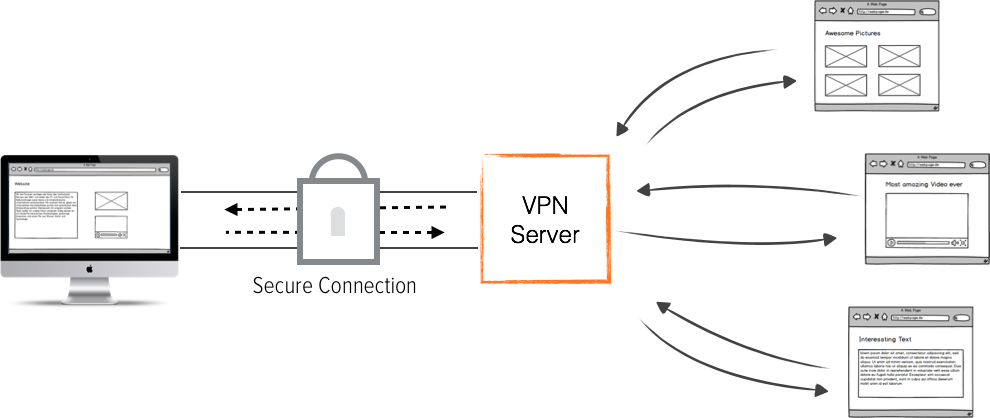(Better) Online Privacy with a VPN
By Protonet Team. Published 16. January 2015.
On December 28th, 2014 Der Spiegel published new documents obtained from Edward Snowden, revealing that the NSA and its associates had significantly greater access to encrypted online communications than was previously thought.
The encryption used in Skype, the video telephony software, for instance, poses no big problem for the intelligence service. Even the use of a virtual private network, or VPN, is no big obstacle for the NSA and other clandestine agencies.
The status quo
Nonetheless, in this article we will be explaining in more detail what VPNs can do and why the use of a VPN is still useful for (better) online privacy. As we are all aware, the Internet, such as we know it, is severely restricted in many countries. But even in countries where we take the freedom to move about unrestrictedly for granted, more than we would like is being monitored and tracked:
- Via Internet service providers, government agencies are able to gain access to your surfing habits.
- Virtually every company operating a website collects data in order to improve its offerings and, ideally, to uniquely identify visitors.
- Especially public Wi-Fi networks such as those available in cafes or at airports are a welcome opportunity for criminals to get at your passwords and other sensitive data.
These scenarios are favored by how the Internet works. For one thing, every device such as a computer, tablet or smartphone can be identified from the unique IP address assigned to it. It is often possible to find your location within a radius of just a few hundred yards. Furthermore, data exchanged via the Internet is not always encrypted. Once someone gains access to your connection, all of your data may potentially be revealed, including usernames and passwords. One good way of preventing others from accessing your data is the use of a VPN.
How does a VPN work?
In most cases, VPN client in the form of small software, for example a browser plugin or an app, is used on your computer. When the VPN client is installed and running, it ensures that all data from your device is transmitted over an encrypted tunnel to your provider’s VPN server. The VPN server then assigns a new IP address for identification and establishes communication with the websites you want to visit. The two greatest advantages of a VPN client:
- All data being exchanged between your device and the VPN server is encrypted. This means that others are unable to view it.
- Website operators can only trace you back to your provider’s VPN server. And instead of your actual IP address, they only see the one for the VPN service.
What can (and can’t) a VPN do?
A VPN can disguise your identity and encrypt your connection:
- Your Internet service provider is unable to see which websites you visit, which videos you watch or who you communicate with.
- The operators of websites are unable to identify or locate you from your IP address. You can usually select IP addresses from other countries from your VPN connection. This enables you, for instance, to deliberately circumvent restrictions in certain countries.
- Your online activities in public Wi-Fi networks cannot be hacked. This means you no longer have to worry about the security of your passwords and banking information!
- But remember, the operator of the VPN is able to identify your data traffic, and even if you use a VPN service; the new documents from Edward Snowden show that with enough effort and the necessary resources nothing is secure.
Can I use a VPN to surf the Internet anonymously?
No. A virtual private network can be compared to the curtains in front of your window. The light shining through shows that someone’s at home, but no one can see what you are doing. A VPN does not make you anonymous, but it can protect your privacy.
Which VPN provider is the right one for me?
There are countless VPN providers. For example, Berlin-based start-up ZenMate offers a free service using browser plugins and paid apps for smartphones that enable the use of a VPN when you are on the go. However, at ZenMate the only thing encrypted during transmission is browser data, i.e. the data you collect when surfing the Net. Emails and calls made using Skype are not covered. At Protonet we have also had good results with VyprVPN from Golden Frog. The Swiss company is pursuing aims of a free Internet similar to ours and directs all data through VPN servers, also taking emails and downloads into account. Our colleague Jan has been using VyprVPN for some time now and has been able to arrange a 25 % discount for our readers for the first year. To qualify for it, just enter the code “PROTONET25OFF” on the order page.
Conclusion
First off: Even a VPN service will not make you anonymous online. With enough will and effort, a governmental body will be able to monitor your activities online. But if you want to protect your privacy, a VPN is still advisable. Here in Germany the use of a VPN is recommended, particularly in public Wi-Fi networks such those available at airports or in Internet cafes. A VPN is also useful if you want to circumvent local restrictions, for example watch blocked YouTube videos or access American services such as Netflix or HBO that are restricted or not offered in Germany. You still won’t become anonymous when using a VPN. But if you value your privacy and personal freedom you should invest in a VPN client.
Popular Read



